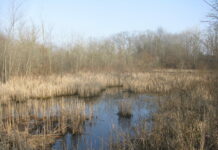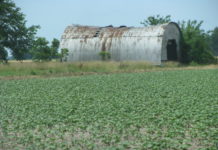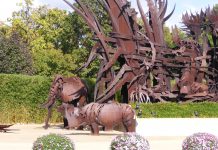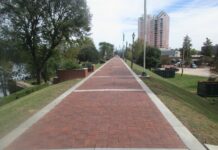Photo credit: DiasporaEngager (www.DiasporaEngager.com).
By: Austin S Fallah: A True Son of Liberia, Africa, and the Planet Earth Soil:
Introduction:
Nestled under the blazing Liberian sun, the Organization of African Unity (OAU) Center, a once glittering emblem of pan-Africanism, has slid into decrepitude.
Located in Banjor, just beyond Monrovia’s city bustle, this site should have been treasured, harboring the shared dreams and aspirations of the African continent.
Instead, its dilapidation evokes poignant images of forgotten heritage and squandered opportunities.
The decline of this historic center runs parallel with the less visible atrophy of a critical sector in Liberia’s tourism.
Through the lens of Kendric White, an impassioned nationalist, we are reminded of the golden days when Liberia’s tourism, bolstered by sites like the OAU Center, brought vital foreign currency to the nation’s coffers.
Yet, whispers of an audacious hope linger, hoping that the Boakai-Koung (JNB-JKK) leadership will deviate from the apathetic trail of their predecessors.
This korero will argue that the Boakai-Koung administration must prioritize the restoration of the OAU Center and the broader tourism sector to reclaim Liberia’s lost source of national pride and economic vibrancy.
The Current State of the OAU Center:
The OAU Center’s dire state is not merely an aesthetic concern but one that symbolizes the neglect of African Unity’s legacy.
Under previous government regimes, the inertia of governmental institutions facilitated the erosion of this once-magnificent structure.
The indifference to this emblem of unity mirrors the lack of vigor in addressing other national priorities, such as tourism.
To allow the OAU Center to languish is to disregard the very tenets of solidarity and collective progress the OAU, and its successor, the African Union (AU), were established to champion.
This negligence has vast implications, not only for national pride but also for economic development.
The Promise of Tourism:
Tourism, a sector once vibrant in Liberia, has the power to revivify economies, create jobs, and provide a sustainable path towards development. Kendric White, in 2013, beseeched the Liberian leadership to reinvest in tourism, reminding them of its historical capacity to attract investment and foreign exchange.
White’s passionate plea resonated with the far-reaching benefits tourism could afford Liberia, including heritage preservation, national branding, and the stimulation of affiliated industries, such as hospitality and crafts.
However, the government of Madam Ellen Johnson-Sirleaf, and likewise others, did not heed this call.
Consequently, Liberia continued to stagger under the weight of unrealized potential, with its socio-economic indicators trailing behind many African peers.
The Need for Visionary Leadership:
The succession of the JNB-JKK administration is a turning point and an opportunity to redirect the narrative.
Tourism embodied by the restoration of the OAU Center, is ripe for investment and innovation.
President Boakai and Vice President Koung must forge a government that guards against the complacency that has stifled progress.
The restoration of the OAU Center can spark a broader renaissance of the tourism sector, offering a symbol of renewal and commitment to African solidarity that could inspire both domestic and international admiration.
Economic Rationale:
From a pragmatic standpoint, the economic rationale for revamping the OAU Center and the broader tourism industry is compelling.
Tourism is a low-hanging fruit in development terms, offering diverse advantages, such as job creation, entrepreneurship, and foreign exchange earnings.
In rebuilding the OAU Center, Liberia can once again tap into the lucrative market of cultural and historical tourism, attracting individuals passionate about African history and its pan-African future.
In addition, tourism has a multiplier effect, infusing vitality into other sectors of the economy, such as agriculture, through increased demand for local produce by hotels and restaurants.
Preserving Cultural Identity:
Beyond economics, the resurrection of the OAU Center holds profound cultural significance.
It would serve as a custodian of Liberian, and indeed African, identity by educating future generations on the significance of their collective history.
African unity, a principle enshrined within the OAU, should be a source of enduring pride.
Through cultural programs, museums, and educational initiatives within an invigorated OAU Center, a narrative fostering unity and understanding can ripple through society.
Harnessing Political Will:
The requisite ingredient for this resurgence of Liberia’s tourism sector is unwavering political will.
The JNB-JKK leadership must commit to making tourism a national priority.
This shift calls for significant investment, policy reform, and international collaboration to elevate Liberia’s tourism to international standards.
Establishing public-private partnerships, incentivizing local investment in tourism infrastructure, and rigorous marketing initiatives are integral to this all-encompassing strategy.
The President Boakai and Vice President Koung (JNB-JKK) administration stands at a crossroads between continued stagnation and the bold resurgence of a crucial economic sector.
Previous governments’ apathy has cast a long shadow over the potential bond within Liberia’s tourism industry.
White’s fervent call to rekindle the tourism flame must not remain unheeded.
The restoration of the OAU Center in Banjor represents more than a construction project, it embodies the resurgence of Liberia’s commitment to unity, heritage, and a reimagined economic future.
The JNB-JKK leadership must recognize that breaking the shackles of the past requires decisive action and an indomitable resolve to see Liberia reclaim her place as a beacon of African potential and prosperity.
The ruins of the OAU Center, under thoughtful and passionate stewardship, can once again stand as a testament to the power of African unity and the unyielding spirit of the Liberian people.
The time to act is now, for the legacy of Liberia and its contributions to African solidarity must be both celebrated and leveraged toward a brighter, more unified future.
Source of original article: Liberia news The New Dawn Liberia, premier resource for latest news (thenewdawnliberia.com).
The content of this article does not necessarily reflect the views or opinion of Global Diaspora News (www.GlobalDiasporaNews.com).
To submit your press release: (https://www.GlobalDiasporaNews.com/pr).
To advertise on Global Diaspora News: (www.GlobalDiasporaNews.com/ads).
Sign up to Global Diaspora News newsletter (https://www.GlobalDiasporaNews.com/newsletter/) to start receiving updates and opportunities directly in your email inbox for free.































